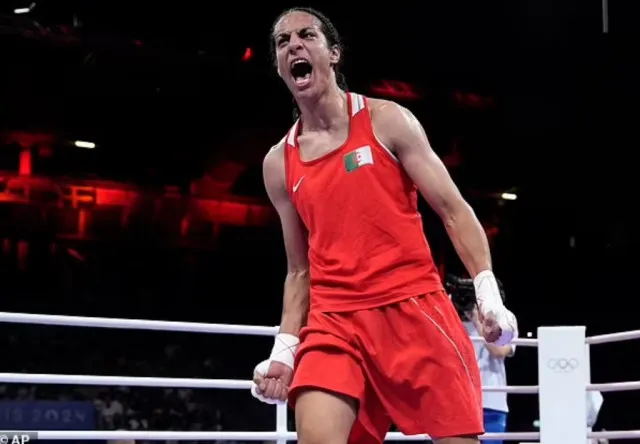Supporters identifying as “biological males” are defending boxer Imane Khelif during controversy over her gender identity at Paris Olympics.
Controversy surrounding Imane Khelif eligibility at the 2024 Olympics
The growing controversy surrounding Algerian boxer Imane Khelif has marked the 2024 Olympic Games in Paris.
The 25-year-old athlete has been the subject of intense scrutiny and debate over her gender and eligibility to compete in the women’s division.
Amid this controversy, there has been a wave of support for her from various individuals and groups, particularly from those identifying as “biological males.”

Khelif is 5’10” tall and has faced accusations from some people regarding a possible biological advantage.
They claim she may have a difference in sex development (DSD) condition that affects her female opponents.
DSSD is an umbrella term for a group of rare genetic conditions where an individual’s reproductive anatomy does not align with the typical definition of male or female.
However, Khelif has firmly denied these claims, stating that she is a woman who has undergone all necessary gender eligibility checks by Olympic organizers.

‘Biological male’ individuals defend Imane Khelif
Intersex individuals and advocates support Khelif, arguing that excluding athletes based on their gender identity is unfair.
They believe this exclusion violates the human rights of athletes like her.
Hannah Twigg, an intersex woman from the UK with Complete Androgen Insensitivity Syndrome (CAIS), shared her experience in sports.
She said, “I was involved a lot in sports teams in high school, and I never felt that my condition gave me an advantage or disadvantage.”

“I would like to take the opportunity to say that Imane Khelif does not owe anyone an explanation for her gender and identity,” she defends Khelif.
In her case, although she has XY chromosomes typically associated with males, her body does not respond to testosterone due to a genetic mutation.
As a result, Twigg has developed the physical characteristics of a female.

Similarly, Khelif’s case appears to be one where her biology may give her certain physical attributes.
People often link these traits, like height and muscle mass, to male athletes.
However, this does not necessarily translate to an unfair advantage, as DSD conditions can manifest in a wide range of ways.
“There is a lot of variation in how DSD conditions can affect an individual’s physical characteristics and athletic performance,” explains Dr. Sarah Gonzalez, a sports medicine specialist.
“Blanket assumptions about inherent advantages are often misguided and can lead to the unfair exclusion of intersex athletes,” he emphasized.

The debate about Khelif has started a larger discussion about including intersex and transgender athletes in sports.
Many people believe that rules based only on testosterone levels or chromosomes do not consider the complexities of human biology and gender identity.
“Imane Khelif is a woman, and she should be allowed to compete as such,” says Taylor Rodgers, an intersex advocate.
“Excluding her or any other intersex athlete from women’s sports based on their physical characteristics is a form of discrimination that we must stand against,” she said.

The most controversial boxing match at the Paris Olympics
Khelif, who represents Algeria, initially failed a gender eligibility test conducted by the International Boxing Association (IBA) in 2023.
The test revealed that Khelif had XY chromosomes, indicating she did not meet the requirements to compete in the women’s category.
As a result, Khelif was disqualified from the 2023 IBA Women’s World Boxing Championships.

Despite this setback, the International Olympic Committee (IOC) confirmed that Khelif can compete in the women’s boxing events.
She will participate in the 2024 Paris Olympics.
This decision has sparked outrage among some athletes and fans as it undermines the principles of fairness and equal competition.
Imane Khelif forces her rival Carini to abandon the fight just 46 seconds into the match
The controversy came to a head during Khelif’s bout against Italian boxer Angela Carini in the round of 16.
Carini reportedly raised her hand and had her head guard checked.
She then landed one punch before walking out of the ring after just 46 seconds.

After the controversial fight, Carini said that Khelif’s punches were the hardest she had ever felt.
This led to a “strong pain in her nose.”
The match ended quickly, which let Khelif move directly to the quarterfinals.
This situation made the debate about her eligibility even stronger.